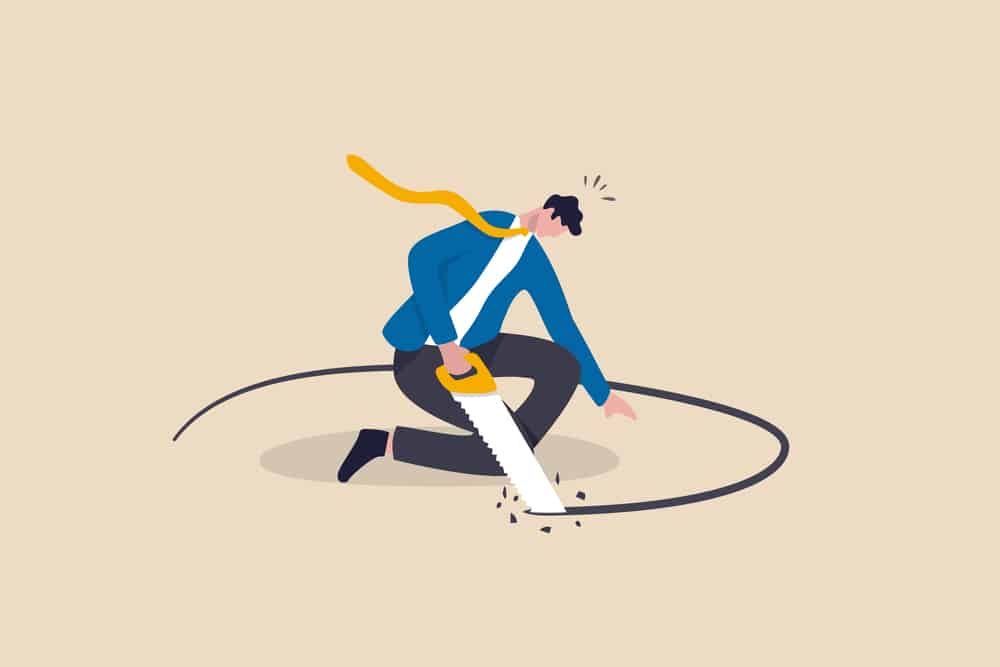Do you remember working hard toward an ambitious goal only to fail spectacularly?
It’s also possible that you feel anxious and stressed when you’re trying to accomplish something significant. In turn, this might make you feel increasingly frustrated, discouraged, and angry with yourself. As a result, you trap yourself in these feelings and cannot accomplish what you need to get done.
Self-sabotage manifests in all of these ways.
You can damage your self-esteem and self-confidence by self-sabotaging. The more you fail at doing something you want, the more you prove to yourself that you can’t or shouldn’t do it.
In this article, you will discover what self-sabotage is and how you can stop self-sabotage.
What Does Self-Sabotage Mean?
Sabotage is the destruction or manipulation of something, frequently undercover. The word is most often used How Self-Sabotage is Often Performedabout spying or in commercial settings where an insider is causing the damage since it typically implies direct and purposeful engagement on the part of the sabotage.
When this harmful action only focuses on yourself, the phrase “self-sabotage” is employed. You might not even be aware of doing it at first. But bad habits undercut your efforts repeatedly might seem like psychological self-harm.
Why Do Individuals Self-Sabotage?
For a variety of reasons, people impede their advancement. They may consciously or inadvertently engage in self-destructive behavior. The root causes might be linked back to early relationships or childhood difficulties. Low self-esteem, coping issues, and issues with cognitive dissonance are some additional causes of this type of destructive conduct.
Common sabotage methods?
Procrastination
Those who self-sabotage delay gratification frequently. With procrastination, you can demonstrate to people that you’re never prepared and delay a positive consequence. People are afraid of disappointing others, failing, or excelling, which is why.
negative self-talk
Negative self-talk, in which you tell yourself that you are inadequate or unworthy of success, frequently catalyzes self-sabotage. You start to get thoughts such as, “You can’t do that!” You are not deserving of that. You’ll probably end up failing if you try, regardless.
Self-Medication
Many people turn to drugs, alcohol, and self-injury to cope with the ongoing conflict between their desire to succeed and the voice in their heads telling them they can’t.
How to Quit self-sabotaging
Here are a few tips that will help:
examine the underlying reasons
Analyze your life for patterns. Have you a tendency to consistently destroy your good intentions? Did these deeds occur while you were about to succeed or on the verge of fulfilling your personal goals?
As previously stated, this behavior could have developmental roots. Some parents encourage their children not to think too large, either because they don’t know any better or because they are concerned their kids won’t be happy. Maybe they questioned your ability to believe you could attend college. You must put forth effort just like everyone else.
Recognize the emotions that influence behavior.
Anxiety, rage, and worthlessness are frequently the root causes of self-sabotage conduct.
For instance, you might have purposely abandoned a report because you were outraged and irritated that your employer had ignored you in the hallway. The incident sparked the feeling, which then produced a self-defeating response.
Your manager, who may have been busy with something else, would be sorry to find that they irritated you. But your emotional response doesn’t take it into account.
Always work to control your emotions to avoid making decisions that will harm others or have unjust effects on them. Before your anxiety or anger spirals out of control, be aware of the warning symptoms.
Stop Procrastination.
Procrastination is a common trait among those who self-sabotage. It could be simpler emotionally to keep putting off what’s vital to you rather than accomplishing a goal people told you would never achieve.
You may feel extreme discomfort due to the discrepancy between where you are and what people drove into your skull for years. So you undermine yourself.
In a recent study on students’ procrastination in academic settings, researchers discovered that a lack of self-control was one prominent issue. It is a result of the freedom, temptations, and lengthy deadlines that students experience.
Social or peer pressure can influence your procrastination. And finally, procrastination was also a result of a lack of study skills.
Adjust your actions, feelings, and thoughts.
You can start to challenge self-destructive feelings, behaviors, and thoughts as you become more conscious of them. And the other two of these three aspects will alter more readily if you can modify one.
Positive affirmations that you support by reasoning can counter negative thinking. Make the opposite of your presumptions to obtain some much-needed perspective.
After that, relate your new, optimistic self-talk to your potential and goals. You can produce the mental, emotional, and physical states required to accomplish any task when your abilities, beliefs, and behaviors are in harmony.
Make an effort to become used to failing.
It’s common to experience fear of emotional suffering, failure, and rejection. Since dealing with these things is typically unpleasant, you take precautions to avoid them.





